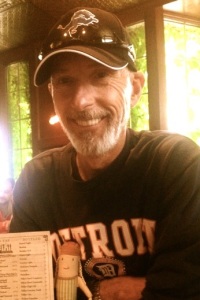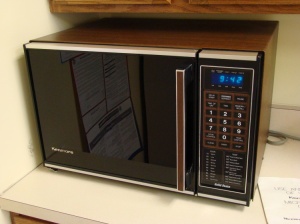
Last time on No Imminent Plan…
Our once-scrappy, now adrift hero, Carl Grubbs was having his coffee when his wife declared, among other things, that she was getting a boob job and leaving him for the plastic surgeon. Plus, he’d missed another story deadline at work. As mornings go, it was not his finest. He was charging headlong into the rapidly collapsing dream that was his life.
But that evening, across the beautiful cliffs of Palos Verdes and down into the working class neighborhood of San Pedro, other happenings were threatening the relative peace of an otherwise perfect California night…
Chapter 2 – The Dock Rats.
“Where is that idiot?” griped Scott Kidnowski, new Head of Harbor Security at the Port of Los Angeles.
He was talking to Jerry, his newly-minted junior supervisor who was in the control tower with him. He suspected Jerry wasn’t really listening because he had his head over a small plastic trash can under the desk trying to vomit away his hangover from the night before. Scott surveyed the area below. The Port of Los Angeles is a sprawling complex made up of 7500 acres of land and water comprised of loading docks, canneries, processing yards and gated high security areas where terrorism was sought and fought by the Los Angeles Port Police. It is one of the busiest ports in the world but tonight, the only working area open during the night shift was a set of four berths, Docking Bays 312-316, in the shape of a dinner fork, four tines sticking out in the south facing San Pedro Bay. The Port Police night shift called it The Pitchfork.
“Did the dipshit get lost?” Scott said as he wondered about Chris ‘Tugboat’ Nevins, the worse half of the half-wit team of junior supervisors he recently promoted. He had sent Tugboat out for Tommy Burgers. Scott was headlong into the midst of suffering his promotion hangover. The Dock Rats had taken him out to celebrate his much deserved and long overdue promotion to Chief Harbor Security Master, Los Angeles Port Police, knowing secretly that their futures hung in the balance. As a result, he could barely concentrate. Excedrin and Alka-seltzer had provided some relief to the waves of nausea and searing lightning bolts of pain but he needed grease to make it through the late shift tonight.
“Yo, any sign of Tugboat’s piece of shit Toyota yet?” Scott said as he radioed from the control tower down to the docks to Mike on Security Team One.
“Negatory, sir,” replied Mike, “Uh, you want me to call him, see if he needs directions?” Mike sounded just as irritated as Scott.
“Nah.” Scott sighed. “Just let me know when the jerkoff arrives.”
“Jerkoff arrival under close watch, sir. Over.” Mike sighed.
Scott was working with three teams down at the docks, all of whom were equally hung over. Mercifully, it was slow. Scott thoughtfully took in the expansive harbor below.
Big haul-in days at the Port Of Los Angeles had slow nights and Tuesdays were one of them. He was expecting a freighter from China, two from Taiwan and one from the Dominican Republic via Panama between the hours of two and four a.m. Piece of cake. It was coming up on 2:15am, two ships were in and two others could be viewed off the coast. Scott dispatched a small team of security officers with K-9s to inspect the containers for illegal substances coming off the ships. The team on the ground radioed in. The walkie-talkie crackled to life.
“Yo, Scott, we’re waiting for the cranes to unload the first containers. Looks like the Dominican ship’ll be light, but not the Chinese freighter,” observed Mike.
“Looks like China first, Tommy burgers second. Feel free to kill Tugboat after the ship’s cargo is off,” Scott said as he massaged his temples.
“Roger that, sir,” Mike said, as he got to work.
Scott surveyed the scene as each container came off the ship. The security team and their K-9s opened the front doors of hard containers for inspection and lifted the rag-tops of soft containers looking and sniffing for narcotics, booze, small arms, machetes and any other suspected illegal foreign materials that might violate a trade agreement or federal law. Terrorism had made the search teams more vigilant in looking for weapons and opiates from Southeast Asia and Afghanistan but more lax in other areas of harmless contraband like foreign liquor without proper papers. Scott ran a tight crew and they had an excellent record of exposing big security breaches. The Mayor had even written him a letter commending him and his team.
As the Chinese freighter unloaded, Scott kept a vigilant eye. He knew that soft, plastic-topped or ragtop containers were a delicate issue. Among harbor security personnel, it was common knowledge that human cargo was often found in these rag-top containers because they allowed ventilation. In the past four years, over three thousand immigrants from China and Korea had traveled and arrived in shipping containers up and down the coast from San Diego to Vancouver often with disastrous and deadly results. It was believed that one in five immigrants survived the three-week ordeal trapped in metal shipping containers with no light, no food, little water, and lots of human waste. Beyond the hurdles of mere survival in a metal box, many faced unsympathetic security, and stern American courts where they hoped to declare political asylum and be granted a chance to stay. In the best case scenario, if an immigrant did win his dream to stay in America, there was a good chance he would find himself herded off the boat into the waiting arms of a gang eager to transport his sorry ass to an East Los Angeles sweat shop making t-shirts for American Apparel.
Human trafficking was a ten billion dollar industry and one of the saddest things Scott had ever seen. During his first year working the docks, he had witnessed a mother who had died from malnutrition and dehydration while her young son, very much alive, cried in her arms inside a shipping container from Beijing. The boy was sent back to China alone. He couldn’t shake the image of the boy watching the Feds cover his mother with a sheet right before he was carried off in the back of a U.S. Immigration van. From that moment, Scott vowed to treat human cargo as human rather than cargo. He didn’t want anyone dying in his harbor. Not on his watch. He would handle with great care those immigrants who risked and tried to scrape out a better life here. For this reason, he decided to head down to the docks to take a closer look at the containers. He forgot his walkie-talkie when he thought he smelled melted cheese on its way.
###
Three teams were on call that night and all three were now scanning and inspecting the containers as they came in. Refrigerated containers usually got a light inspection due to the nature of the cargo. Usually fish, squid, poultry or beef. There was a huge refrigerated container from China of which the dogs took one whiff of and started barking like mad. The security team looked up at the container and checked the manifest. It was marked as smoked meats and hot dogs. All urgent interest from the humans on the scene was lost. The dogs however were trying like hell to signal something was amiss.
“What the hell?” Mike Furniss murmured as he held the dogs back and peered into the container. All he saw were pallets of hot dogs. He closed the door and radioed up to control, “Hey Scott, my dogs are going crazy over the smoked meats cold box. Should we move it in the secured area, take a better look? Over.”
No response. Mike waited another minute and radioed again, “Hellloooooo, do I have to wait until you finish your French fries before I get some direction here?”
###
Chris “Tugboat” Nevin’s Toyota pickup sped into the loading area down below just in time to nearly run over his newly promoted boss. Tugboat slammed the brakes and the truck slid sideways on a wet patch, launching one giant bag of Tommy burgers out the truck window and onto the grimy, fish-gut-covered pavement. This triggered a seagull red alert as the scavenger birds sprang to life and began dive-bombing the truck to get near the fallen Tommy burgers.
“Jesus!” Scott shrieked as he jumped out of Tugboat’s way as a seagull swooped down menacingly close to his head. His reaction time was surprisingly fast for a man with a hangover . “God damn it, Tug!” Scott yelled into the headlights of the Toyota.
“Shit. Sorry, Scott,” Tugboat nervously said. “What are you doing down here? You could get killed.”
“The odds increase substantially when you’re around, Tug,” Scott said. He outstretched a hand in Tugboat’s direction. “I’m down here to inspect some of the ragtops. Cheeseburger, please.”
“Right, you had, uh, one without onions?” Tugboat jostled the bag of burgers searching for the right one. “Or the one with grilled onions?”
“Doesn’t matter. Give me a cheeseburger before I fire you for incompetence.”
Tug tossed one to Scott who caught it and swiftly walked away over to where Mike Furniss was standing.
“Anything suspicious?” Scott asked as he took a huge bite of his piping hot chili cheeseburger.
“Nah, not really.” Mike paused. “Although my dogs went crazy about ten minutes ago over a refrigerated container coming off the Chinese freighter. I made a brief check – it was hot dogs. I radioed you but I guess you were on your way down here. Jerry said that the dogs were just confused because, you know, hot dogs. He told me to put it in regular holding.”
Scott looked down realizing he forgot his walkie-talkie. He nodded quietly and kept chewing. But as the Tommy burger started to seep in and make his brain function properly, Scott’s critical thinking came back.
“Hot dogs?” Scott questioned a Mike’s words sunk in.
“Yep,” replied Mike.
“From China?” Scott inquired further, growing more concerned.
“Uh, yeah.” Mike nodded.
“And the K-9s were going nuts?” Scott asked.
“Yeah, but you know… dogs love hot dogs,” Mike said with a hint of uncertainty in his voice. “That’s what Jerry said anyway.”
“I see your logic there, Mike, but these are highly trained dogs. Hot dogs coming from China don’t add up. Japan maybe, Kobe beef hot dogs. Where did you direct that container?” Scott asked, as a silent alarm started to go off in his head.
###
Five minutes later, Scott and Mike were standing in the processing yard in front of the container from the Chinese freighter. Scott stood back as Mike opened the door to the refrigerated container.
“Hey, uh, Scott?” Mike said as he inched inside the container with his flashlight.
“Just hot dogs?” Scott asked, a note of anxiety in his voice.
“Well, yeah, these are hot dogs alright. But that’s not what I was going to say.”
“What, then?”
“Well, it’s not cold in here. Not even a little bit. And there’s a fan blowing.”
“Oh shit,” Scott muttered, more to himself than to Mike. “It’s ventilated.” He took two steps toward the mouth of the container and in that second, twenty-five Chinese immigrants in tattered clothing stormed the door and came streaming out of the shipping container. The terrified crowd knocked Mike and Scott on their backs nearly trampling the security officers. Mike tried to grab for his walkie-talkie but a frantic, fleeing Chinese foot sent it skittering across the pavement.
“Team Two! Team Three! We have a code red in section 314!” Scott cupped his hands and yelled desperately for backup. But no one could hear him as he watched a horde of fleeing Chinese head off into the darkness.
###
On the other side of the shipyard at Docking Bay 312, all was going relatively well as Security Team Two was inspecting some funky substances from the Dominican Republic container, unable to identify most of it. Wedge, short for Sal Wedgeman, a short, stocky man who was Team Two leader, shook his head and wore a genuinely confused expression as he inspected the jars of powders and bags of dried herbs. A lot of it looked suspicious and highly illegal but when they stuck it right under the noses of the dogs, the K-9s appeared utterly bored with the Dominican shipment and its contents.
“Antoine,” Wedge shouted. “Come over here for a second.”
Antoine, a tall black man sporting impressive dreads, a goatee, and perpetually smelled like patchouli ambled over and looked at what Wedge was holding.
“Not to profile you or anything but you come from this general geographic area, right?” asked Wedge, “Any idea what this shit is?”
Antoine inspected most of it and then took a closer look at a small jar of white powder. On the bottom of the jar there was a small stamp of a snake. Antoine narrowed his eyes and paused.
“Voodoo potions, mon,” Antoine said casually in a Jamaican accent.
“No shit?” Wedge said interested. “Like black magic? I thought all that kind of shit came from Haiti.”
“Dominica is da same island, brudda,” Antoine said as he lit a cigarette and then smiled. “But ‘dis is harmless, mon. Most of ‘dis stuff ‘dey sell as novelty shit in the Botanicas. You know, put a hex on your boss, win the lottery, love potions, that kind of tourist voodoo crap.”
“I need a love potion for Sheila,” Wedge said, referring to his current girlfriend. He sighed and took one more look at the disinterested dogs and their reaction to the contents. “Alrighty. Send it on to regular processing.”
As Wedge moved on to another container, Antoine discreetly took the small glass jar of white powder stamped with a snake and put it in his work duffel bag. The dogs ignored him completely.
###
“Great work, Mike, INS is on its way and the ambulance is there, right?” Scott said as he paced back and forth inside the Control Tower. He was in contact with his security team on the ground.
Jerry was sitting in the corner as effective as a toaster. Tugboat was standing by the desk with a Tommy burger in one hand and a gun in the other.
Scott hung up. “Okay, the ambulance is on the way and I just heard from Wedge over on Docking Bay 312, they have three people from the container in custody, two women and a child. Let’s head over there.”
Tugboat checked his weapon then cocked it. Scott looked over at him.
“Ease up there, Rambo. They’re refugees not criminals,” Scott said.
“But, Scotty,” Tugboat said, “what if they’re refugees and criminals?”
Scott got the feeling Tug was itching to shoot someone with his shiny, new Junior Supervisor title. He looked directly at Tugboat, “Do starving women and children dressed in rags seem like they’re armed and dangerous to you?”
“You never know man,” Tugboat remained obstinate. “I mean they could be part of the Hong Kong Triad. In my video game they’re really up and coming.”
“If anyone fires a weapon, it’s going to be me, blowing my brains out. Now move.”
###
Scott, and his crews arrived down by Docking Bay 312 just in time to see two young Chinese men and a small child sitting on the back of the ambulance as the EMTs administered first aid. The child was chewing on a half a Tommy burger. INS was asking them questions through an interpreter. The teams reported to Scott that no other refugees, alive or otherwise, had been found in the harbor yet. Scott suspected they hightailed it into San Pedro under the cover of darkness, alone, afraid, no food, or shelter. But after considering the alternative of human traffickers and Los Angeles sweatshops, he wondered if they weren’t better off with the garden variety hookers and junkies on the streets of San Pedro.
“It looks like things are under control here.” Scott turned his attention to Wedge. “You finished inspecting the Dominican containers?”
“Yes, sir. Sent to regular processing after a thorough inspection. No problems,” Wedge answered.
“Best news I’ve heard all night. Two Panamanian freighters have arrived and need our immediate and undivided attention,” Scott said, seeing the light at the end of the hangover. “Take your team and head that way. Let’s get this night over with.”
“You got it, Chief.” Wedge took his team and headed to Docking Bay 316.
Scott turned his attention back to the ambulance and ten blissfully quiet minutes passed before his walkie-talkie crackled to life.
“Chief, we have a small problem over at DB 316,” Wedge reported. “With the Panamanian freighter.”
“Uh-huh.” Scott cringed. “Define small.”
“Well, the dogs almost missed it because of the coffee, but we’ve got Venezuelan cigarettes. The papers say Columbia Coffee and Panamanian Rum. No papers for Venezuelan cigarettes. Over?” Wedge reported.
“Oh, okay,” Scott said, pleasantly surprised that, in fact, it was just a small problem. “Get the ship liaison down and read him his rights. I’ll be right there.”
****
Scott walked over to DB 316 where he saw the familiar pockmarked face of Luigi Calvarone. Inexperienced traders attempting first time shipments that came to the US hired Luigi, a freelance liaison, to deal with the border patrol and harbor security. He spoke five languages and had the air and cologne of a cheap attorney not quite on the right side of legal. Not far from Luigi, a short man who was built like a fire hydrant stood in an expensive white linen suit smoothing over his waxed mustache. His hair was dark and wavy, and his eyes stayed hidden behind a pair of tinted glasses so bug-eyed and oversized that Scott thought they might be women’s sunglasses. The man didn’t say a word.
“Mr. Kidnowski, congratulations on your promotion, well deserved, well deserved,” Luigi said warmly, as he extended his hand.
“Thanks, Luigi,” Scott shook his hand and eyed the man in the linen suit. “Seems we have a problem here.”
“It does appear that way, sir. May we speak privately?” Luigi inquired as he gestured to the man in the linen suit to stay where he was.
Scott, although suspicious, granted Luigi a private audience a few feet away from the security teams.
“We are men of action, are we not? Paperwork is for the bean counters and pencil pushers. Please let me explain my dilemma.” Luigi spoke softly in a musical way and smiled, “My client –“
Scott interrupted Luigi. “Who is your client?” Scott looked suspiciously over at the short sparkplug of a man.
“Er, his name is Baren Bonavico. Goes by Barry to his friends. I call him Mr. Bonavico. A very upstanding citizen who cannot afford to waste time dealing with Federal ATF agents and certainly we do not want complications of, shall we say, an international nature over cigarettes when it is simply a matter of a paperwork oversight. My client, he made the mistake of hiring his wife’s sisters,” Luigi implored. He held his hands in a pleading way. “Dingbats.”
Scott looked at the Luigi and nodded in recognition. Family always gets you in trouble. His brother-in-law almost got Scott canned for trying to slip a half of a blue fin tuna into the trunk of his Chevy Impala.“So, what are you getting at?” he said, with a little more understanding.
“Well, I am simply suggesting that my client, Mr. Bonavico pay a fine. Directly to you and your men, of course. Right here, right now. We will be on our way and we can forget this whole thing happened.”
Scott looked skeptically at the man and then said, “Sounds less like a fine and more like a bribe. I can’t be bribed, Luigi.”
“Not a bribe, my friend! Merely a showing of our gratitude for ease in processing. We’re talking about cigarettes! Not Escobar’s cocaine! How about somewhere in the neighborhood of five hundred cash and a case of Panamanian rum?” Luigi suggested.
“That’s a nice neighborhood,” Scott said to Luigi and then looked over at Bonavico. “But it’s not a bribe. And we’re doing a thorough manned inspection of everything else in that container.”
“Of course,” Luigi said, still smiling as he looked back at his client. Bonavico stood there in his white linen suit not smiling. He smoothed his groomed mustache again. Scott thought he was watching them like a man trying not to get caught watching.
At that moment, Tugboat came running up to Scott panting and pointing at his walkie-talkie.
“Coast Guard!” Tugboat sputtered, “That other freighter! They just found loads of cocaine on it. We gotta dock them right now. The FBI is on its way, so is the DEA and maybe even the Federales. They said it’s the Mexican Mafia! The Coast Guard ordered all our men out on the docks to bring them in,” Tugboat said, gasping, on the verge of hysteria.
“Good god, this night.” Scott grumbled as he massaged his temples. “Okay, gather everybody else and go. I’m right behind you.”
Tugboat nodded in his out-of-breath, slack-jawed way, and took off flailing and frantic like a kid hopped up on Red Bull and gummi bears.
Scott put his hands on his hips and looked back at Luigi and then over to the shady short man in the linen suit. Five hundred bucks and a case of rum could hardly be considered a bribe. It was more like a thank you. Then he looked over at the Venezuelan cigarettes. He took stock of the night so far. Immigrants loose. Mexican Mafia. Gun-happy junior supervisors. And now the motherfucking Coast Guard. He had no time for cigarettes.
“Leave the rum with Sal Wedgeman. He’ll take care of the processing,” Scott said and then smiled cheerfully. “But get it out of my harbor before I get back.”
“Consider it done.” Luigi said, and then handed a small envelope of cash to Scott.
Scott stood there for a few seconds and realized that the cash felt dirty. It felt like a bribe. Somehow the rum seemed more convivial. Like old seafaring tradesmen making a fair deal over booze. Like pirates. But the money, no, the money felt dirty.
“The rum will do.” He handed the envelope back to the liaison.
A surprised Luigi hesitated and then took the envelope and slipped it back into his suit coat. “Of course, Mr. Kidnowski, as you wish.”
“One more thing,” Scott added and then pointed to Bonavico. “The family excuse only works once. Get your paperwork in order next time, Mr. Bonavico otherwise I won’t be so generous,” he said sternly then he motioned to Wedge.
Wedge ran over.
“Yeah chief? Wedge asked as he came forward.
“Take one case of rum and process everything else. But Wedge, scrutinize as if you’re a prison warden, you hear me? The cigarettes are okay,” Scott said.
“Aye, aye, Cap’n.” Wedge signaled to his teams as they started lifting the cigarettes out of the giant plastic bins filled with coffee.
Scott watched for a few minutes to make sure there everything went smoothly without any last minute protests. Then he nodded to Wedge and stalked off in search of Jerry, Tugboat, and his security teams. He straightened his shitty, government-issue tie and set off to the other side of the docks as he mumbled to himself, “The fucking Coast Guard.”
###
However, the highly sensitive noses of the Harbor Security German Shepards are never wrong. Scott Kidnowski could not have known that Baren “Barry” Bonavico had just smuggled in the largest shipment of Venezuelan cocaine in the history of the Port of Los Angeles right under the watchful eye of Harbor Patrol. Barry watched as the plastic pallets that held the cigarettes were loaded onto a truck. There’s money in chaos, he thought.

 Attention Readers of this blog (a small, wily group of people who are most likely related to me):
Attention Readers of this blog (a small, wily group of people who are most likely related to me):




